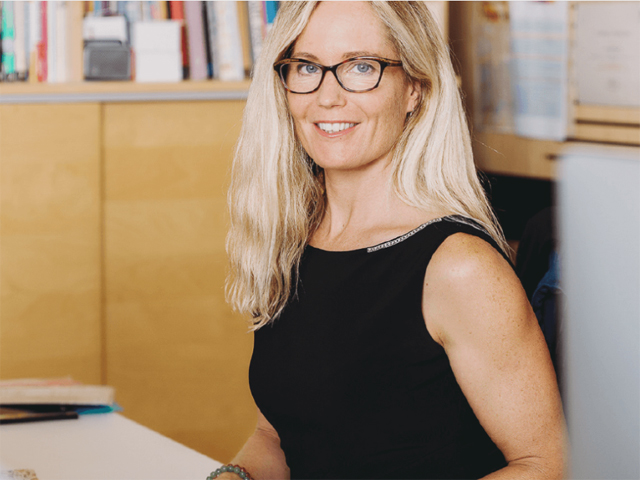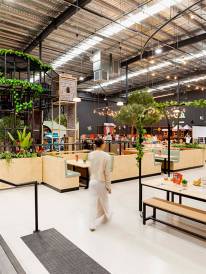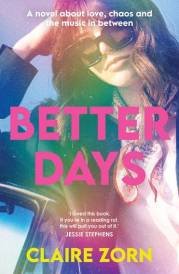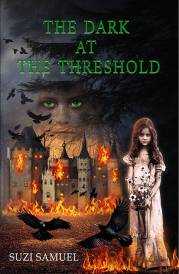Suzanne Haddon Rooland Interview

Interview with Suzanne Haddon
Suzanne Haddon is the Founder of Rooland, a Wollongong-based creative studio that creates long-lasting brand experiences. They specialise in brand design services including branding, packaging, digital and print design. Suzanne also leads RooCreate, a successful eco-packaging platform startup that complements Rooland's offering.
Question: Can you tell us about Rooland and RooCreate?
Suzanne Haddon: My business, Rooland, is a creative design studio located at the University of Wollongong's Innovation Campus. We're a team of seven, including myself, and are focused on creating long-lasting brand experiences via design including eco branding, packaging, digital and print design.
But what sets us apart from the rest is our mission and purpose; we seek to create absolute excellence in design, whilst upholding the promise of a more sustainable future. We have an enduring passion to move towards a more sustainable society by inspiring and creating change through our designs.
It's our passion that then led me to launch RooCreate, my newest eco-friendly business adventure, where the branding and packaging experience becomes one cohesive process utilising smart, simple and sustainable marketing strategies. Put simply, we want to revolutionise the branding design and packaging industry to help save the planet.
RooCreate helps us to proactively see this mission come to life as we work with clients to move towards eco-friendly alternatives that fit within their budget.
We have an extensive client base across Australia, including household names such as Nike, Nestlé, Daily Grind and The Pines.
Question: What challenges did you face as a female entrepreneur on a mission to save the planet?
Suzanne Haddon: When I first started my business, it took time for my suppliers to believe in what I was trying to establish with RooCreate. It's not easy to get people to believe in your dream; you have to keep validating your process, believe in your vision and continually refine and align your goals. Once we launched, we were inundated with enquiries, so we knew we were onto something, and now we have trouble keeping up with all the orders!
As an entrepreneur, it can be quite difficult to secure the right kind of financial backing for your company. I experienced this challenge too, but my determination to get my idea off the ground was far greater. Mind you, it wasn't easy, but I knew I had a great idea, good planning and projections, and was persistent until I found the right financial fit.
On a personal level, another challenge I had to overcome was indirect sexism. When I attended networking events with my husband, the questions would most often be directed to him, not me – and my husband doesn't work in the business. I would always answer regardless, and tried not to let it bother me, but it did make me wonder why people tend to look to a man when asking difficult questions, even though I had the same business name tag.
The challenges were and remain aplenty, but I've learnt how important it is to stay committed to yourself and persevere through the hurdles, as it's all worth it in the end.
Question: How do you hope to create a more sustainable society?
Suzanne Haddon: My ambition stems from my deeply rooted passion for the environment and living a sustainable lifestyle. I believe that making a bold branding statement doesn't have to be expensive or harmful to the environment. In fact, choosing eco-friendly packaging, manufacturing and transporting tactics that are recyclable and biodegradable, is easier and more cost-efficient than one may think.
So, through Rooland and RooCreate I hope to inspire businesses to implement innovative design practices that will reduce their carbon footprint and eliminate unnecessary waste in product packaging"a huge benefit for the consumer and mother earth. Eco-friendly packaging is alive and well, but my vision to fuse together branding design and packaging into one sustainable practice is a new and exciting method of marketing for business owners around the globe.
We want to create an iconic language around how to dispose of your packaging material after you're done with its use. We want to help people and councils on how to talk about what happens after the use of a package, such as repurpose, reuse, regift, and lastly recycle.
Question: What are the key steps you've taken to maintain simple green practices?
Suzanne Haddon: First of all, from a business owner perspective, I blend into our weekly Monday meeting a show-and-tell around packaging with purpose. We open it up to talk about what moved us and what impacted our week around the planet. Everyone in the office has a voice and we are all equally passionate about what we do. I have the most amazing team who believe in our vision and strive to do better in everything we create for our customer experience. We are very aware of single use plastic and using our own to-go cups; it's not a question but a passion amongst us all.
"Be mindful of buying items, think to yourself how badly do you need it, is there time to find it online as a second use?"
We always step back and take a broader look to consider if there's anything else we can be doing, or recommending to our clients, that's eco-friendlier.
For example, we recommend simple green practices such as using water or soy inks instead of petroleum-based inks, using chlorine-free and recycled materials, and sourcing like-minded suppliers that offer environmentally friendly practices. Simple, easy to manage changes that have a long-lasting positive impact.
On a personal level, my passion and mission in life is to change the way we recycle, design and think about our precious resources, materials and how to do things better with conscience design. I practice what I preach by introducing composting into iAccelerate at the University of Wollongong and inspire my fellow business colleagues to go greener. We brainstorm ways to educate and add to our package design, on how to reuse and repurpose each package. I constantly keep learning about new materials and go deeper into understanding PLA starch materials and how they can be used for added shelf life for food items.
I am passionate about education and inspiring the next generation with my knowledge.
Question: How important is sustainability practices for businesses?
Suzanne Haddon: It's the way of the future. Consumers across the world are today more than ever aware of their environmental footprint and are determined to reduce their impact. It's a powerful movement; they all understand individual contributions amount to global change and improvement.
So, if businesses don't start taking responsibility and reviewing their own environmental impact today, whether it's their product packaging, carbon footprint or recycling system, they're going to have trouble in the future. Consumers will not purchase their products or use their services, instead, opt for their eco-friendly counterpart and significantly affect your bottom-line.
Question: How can other businesses adopt this approach?
Suzanne Haddon: Come and see us at Rooland and RooCreate! In all seriousness, we can help businesses reassess their environmental impact and make recommendations for improvement across all aspects of branding, design and packaging.
It's all about being aware, listening to what your consumers want and making proactive changes towards a better future.
Question: What proactive steps can consumers take to help save the planet?
Suzanne Haddon: Be mindful of your actions. Reflect on lifestyle habits and consider taking one thing out of your daily routine and see how you adjust. For example, take out cling wrap and find how you can get by without it. Stop buying single use bags, reuse bags you get from products in pouches. Build a compost in your backyard and get your kids to help and encourage your family to feed the worms. While at the grocery store, see if you can shop without buying anything with plastic. You will save on your grocery bill and eat healthier, a win, win.
Other simple practices such as turning off your shower while soaping up, buying ethical brands, being mindful of energy use and turning off extra appliances and chargers are all great steps towards reducing your environmental impact.
Question: What's next, for you?
Suzanne Haddon: For me, I'm committed to growing RooCreate into the eco-friendly business I know it can be to make a stronger impact on the planet.
In my opinion, there's too much packaging in general. My ultimate dream is to make all packaging eco-friendly by designing smarter, with no plastics, less material, and smaller print runs where we can test the packaging, adjust and reprint, minimising waste.
I'm on a mission to achieve this, so my next big project is to involve our clients more in the design process, so they too can see the impact, through the launch of a 3D builder workspace that will be available to our clients on our platform.
We understand it's hard to sign-up for something that you can't visualise yourself, so our new workspace will allow our clients to proof with us along the way and have access to a gallery of packaging and collateral material in 3D that they can view (from all angles), discuss, share, re-order or adjust. With this, we will be able to educate our clients on simple green practice alternatives, and our clients will be able to view and understand the eco-friendly adjustments before the final packaging is produced. We plan to bring them along with us on the journey and create a better future one design at a time.
I'm excited about what the future holds for us, and we look forward to revolutionising the way forward for eco-friendly packaging design and branding.
Interview by Brooke Hunter
MORE



